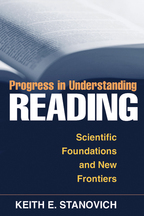Progress in Understanding Reading
Scientific Foundations and New Frontiers
Keith E. Stanovich
Foreword, Isabel L. Beck
Preface
I. The Role of Context Effects in Models of Reading
1. Early Applications of Information Processing Concepts to the Study of Reading: The Role of Sentence Context
2. Automatic Contextual Facilitation in Readers of Three Ages
Richard F. West and Keith E. Stanovich
3. Toward an Interactive Compensatory Model of Individual Differences in the Development of Reading Fluency
4. The Interactive Compensatory Model of Reading: A Confluence of Developmental, Experimental, and Educational Psychology
II. Phonological Sensitivity and the Phonological Core Deficit Model
5. Early Reading Acquisition and the Causes of Reading Difficulty: Contributions to Research on Phonological Processing
6. Assessing Phonological Awareness in Kindergarten Children: Issues of Task
Comparability
with Anne E. Cunningham and Barbara Cramer
7. Explaining the Differences between the Dyslexic and the Garden-Variety Poor Reader: The Phonological-Core Variable-Difference Model
8. The Phenotypic Performance Profile of Reading-Disabled Children: A Regression-Based Test of the Phonological-Core Variable-Difference Model
with Linda S. Siegel
III. Matthew Effects in Reading
9. Tying It All Together: A Model of Reading Acquisition and Reading Difficulty
10. Matthew Effects in Reading: Some Consequences of Individual Differences in the Acquisition of Literacy
IV. The Importance of Word Recognition in Models of Reading
11. The Word Recognition Module
12. Concepts in Developmental Theories of Reading Skill: Cognitive Resources, Automaticity, and Modularity
V. The Cognitive Consequences of Literacy
13. Measuring Print Exposure: Attempts to Empirically Track "Rich Get
Richer" Effects
14. Exposure to Print and Orthographic Processing,
with Richard F. West
15. Does Reading Make You Smarter?: Literacy and the Development of Verbal Intelligence
16. Literacy Experiences and the Shaping of Cognition, Stanovich,
with Anne E. Cunningham and Richard F. West
VI. Discrepancy Definitions of Reading Disability
17. Reading Disability Classification: Are Reforms Based on Evidence Possible?
18. Discrepancy Definitions of Reading Disability: Has Intelligence Led Us Astray?
VII. The Reading Instruction Debate: Comments on the "Reading Wars"
19. Putting Children First by Putting Science First: The Politics of Early Reading Instruction
20. Romance and Reality
21. 25 Years of Research on the Reading Process: The Grand Synthesis and What It Means for Our Field



